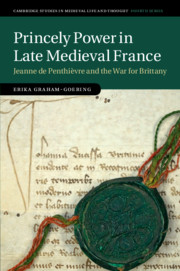Book contents
- Frontmatter
- Dedication
- Contents
- Illustrations, Maps, and Tables
- Acknowledgements
- A Note on Names
- Abbreviations
- Introduction
- 1 The Career of Jeanne de Penthièvre
- 2 Concepts of power in Jeanne de Penthièvre’s acta
- 3 Managing Property: Inheritance and Seigneurial Partnerships
- 4 Managing People: Followers and Service
- 5 Managing Order: Conflict, Negotiation, and Women as Lords
- 6 Debating the Social Context of Princely Power in 1341
- 7 Legitimate Rule and the Balance of Power
- Conclusion
- Bibliography
- Index
2 - Concepts of power in Jeanne de Penthièvre’s acta
Published online by Cambridge University Press: 31 March 2020
- Frontmatter
- Dedication
- Contents
- Illustrations, Maps, and Tables
- Acknowledgements
- A Note on Names
- Abbreviations
- Introduction
- 1 The Career of Jeanne de Penthièvre
- 2 Concepts of power in Jeanne de Penthièvre’s acta
- 3 Managing Property: Inheritance and Seigneurial Partnerships
- 4 Managing People: Followers and Service
- 5 Managing Order: Conflict, Negotiation, and Women as Lords
- 6 Debating the Social Context of Princely Power in 1341
- 7 Legitimate Rule and the Balance of Power
- Conclusion
- Bibliography
- Index
Summary
The historiography of elite women has often contrasted ‘power’, the effective ability to command and be obeyed, with ‘authority’, the sanctioned right to lead. Using Jeanne’s charters as an idealized projection of her actual position, this chapter argues that this model is too restrictive to reflect contemporary understandings of lordly roles. On the surface, these texts seem to associate Jeanne with ‘authority’ and Charles with ‘power’, but a closer examination reveals that neither authority nor power was monolithic: different types of authority coexisted with different types of power, and all could vary jointly or independently. Moreover, these concepts were not static points of reference, but were actively manipulated by contemporaries according to various social norms. This suggests that instead of using the power/authority dichotomy, a more effective model of power dynamics would account for both the people or things over which power was exerted, and the practical and ideological grounds on which it worked. Approaching power from this contextually specific angle enables more diverse comparisons by privileging no single explanatory factor, aim, or outcome of power, and gives greater insight into the complexity of medieval political structures and their social functions.
- Type
- Chapter
- Information
- Princely Power in Late Medieval FranceJeanne de Penthièvre and the War for Brittany, pp. 78 - 99Publisher: Cambridge University PressPrint publication year: 2020



